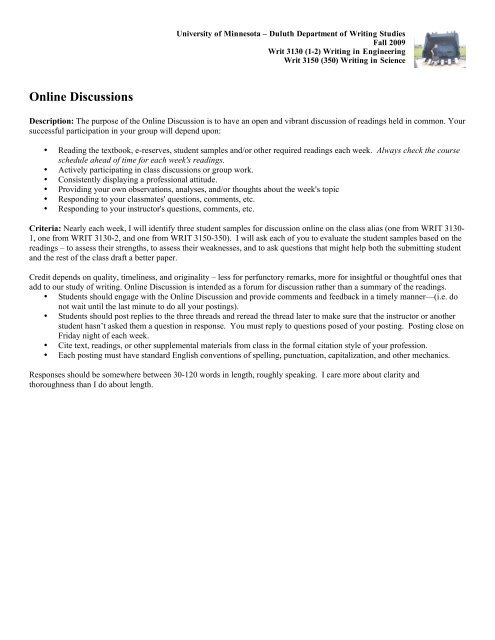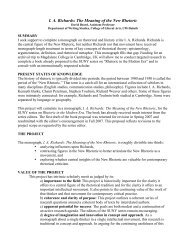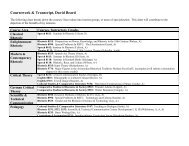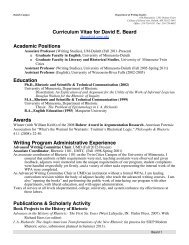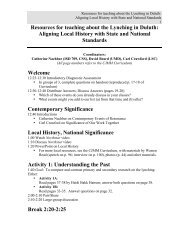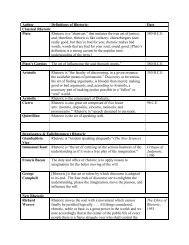Writ 3130 (1-2) Writing in Engineering Writ 3150 (350 ... - David Beard
Writ 3130 (1-2) Writing in Engineering Writ 3150 (350 ... - David Beard
Writ 3130 (1-2) Writing in Engineering Writ 3150 (350 ... - David Beard
You also want an ePaper? Increase the reach of your titles
YUMPU automatically turns print PDFs into web optimized ePapers that Google loves.
University of M<strong>in</strong>nesota – Duluth Department of <strong>Writ</strong><strong>in</strong>g Studies<br />
Fall 2009<br />
<strong>Writ</strong> <strong>3130</strong> (1-2) <strong>Writ</strong><strong>in</strong>g <strong>in</strong> Eng<strong>in</strong>eer<strong>in</strong>g<br />
<strong>Writ</strong> <strong>3150</strong> (<strong>350</strong>) <strong>Writ</strong><strong>in</strong>g <strong>in</strong> Science<br />
Onl<strong>in</strong>e Discussions<br />
Description: The purpose of the Onl<strong>in</strong>e Discussion is to have an open and vibrant discussion of read<strong>in</strong>gs held <strong>in</strong> common. Your<br />
successful participation <strong>in</strong> your group will depend upon:<br />
• Read<strong>in</strong>g the textbook, e-reserves, student samples and/or other required read<strong>in</strong>gs each week. Always check the course<br />
schedule ahead of time for each week's read<strong>in</strong>gs.<br />
• Actively participat<strong>in</strong>g <strong>in</strong> class discussions or group work.<br />
• Consistently display<strong>in</strong>g a professional attitude.<br />
• Provid<strong>in</strong>g your own observations, analyses, and/or thoughts about the week's topic<br />
• Respond<strong>in</strong>g to your classmates' questions, comments, etc.<br />
• Respond<strong>in</strong>g to your <strong>in</strong>structor's questions, comments, etc.<br />
Criteria: Nearly each week, I will identify three student samples for discussion onl<strong>in</strong>e on the class alias (one from WRIT <strong>3130</strong>-<br />
1, one from WRIT <strong>3130</strong>-2, and one from WRIT <strong>3150</strong>-<strong>350</strong>). I will ask each of you to evaluate the student samples based on the<br />
read<strong>in</strong>gs – to assess their strengths, to assess their weaknesses, and to ask questions that might help both the submitt<strong>in</strong>g student<br />
and the rest of the class draft a better paper.<br />
Credit depends on quality, timel<strong>in</strong>ess, and orig<strong>in</strong>ality – less for perfunctory remarks, more for <strong>in</strong>sightful or thoughtful ones that<br />
add to our study of writ<strong>in</strong>g. Onl<strong>in</strong>e Discussion is <strong>in</strong>tended as a forum for discussion rather than a summary of the read<strong>in</strong>gs.<br />
• Students should engage with the Onl<strong>in</strong>e Discussion and provide comments and feedback <strong>in</strong> a timely manner—(i.e. do<br />
not wait until the last m<strong>in</strong>ute to do all your post<strong>in</strong>gs).<br />
• Students should post replies to the three threads and reread the thread later to make sure that the <strong>in</strong>structor or another<br />
student hasn’t asked them a question <strong>in</strong> response. You must reply to questions posed of your post<strong>in</strong>g. Post<strong>in</strong>g close on<br />
Friday night of each week.<br />
• Cite text, read<strong>in</strong>gs, or other supplemental materials from class <strong>in</strong> the formal citation style of your profession.<br />
• Each post<strong>in</strong>g must have standard English conventions of spell<strong>in</strong>g, punctuation, capitalization, and other mechanics.<br />
Responses should be somewhere between 30-120 words <strong>in</strong> length, roughly speak<strong>in</strong>g. I care more about clarity and<br />
thoroughness than I do about length.


